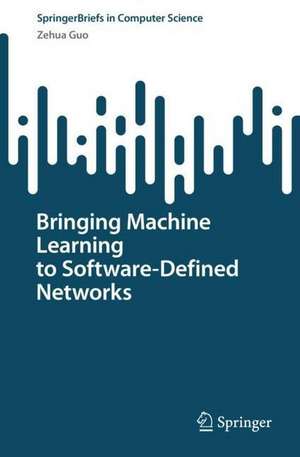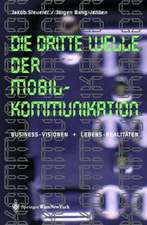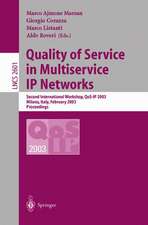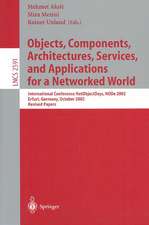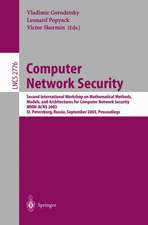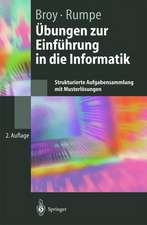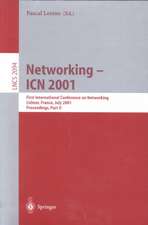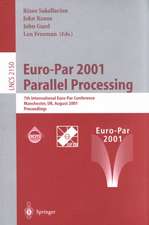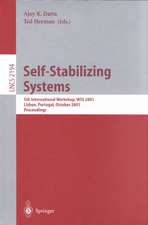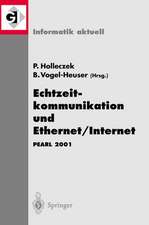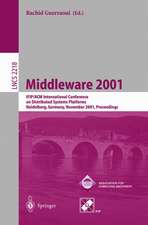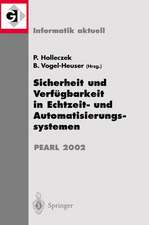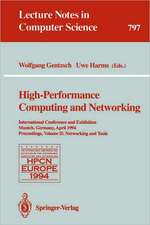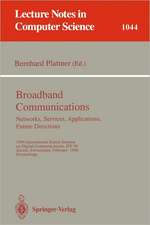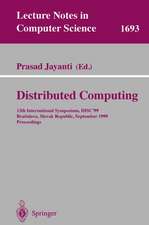Bringing Machine Learning to Software-Defined Networks: SpringerBriefs in Computer Science
Autor Zehua Guoen Limba Engleză Paperback – 6 oct 2022
Din seria SpringerBriefs in Computer Science
-
 Preț: 475.83 lei
Preț: 475.83 lei - 20%
 Preț: 166.97 lei
Preț: 166.97 lei - 20%
 Preț: 325.63 lei
Preț: 325.63 lei - 20%
 Preț: 349.15 lei
Preț: 349.15 lei - 20%
 Preț: 302.49 lei
Preț: 302.49 lei -
 Preț: 381.81 lei
Preț: 381.81 lei -
 Preț: 446.47 lei
Preț: 446.47 lei - 20%
 Preț: 296.17 lei
Preț: 296.17 lei - 20%
 Preț: 335.66 lei
Preț: 335.66 lei - 20%
 Preț: 463.83 lei
Preț: 463.83 lei - 20%
 Preț: 323.00 lei
Preț: 323.00 lei - 20%
 Preț: 322.35 lei
Preț: 322.35 lei - 20%
 Preț: 321.85 lei
Preț: 321.85 lei - 20%
 Preț: 232.68 lei
Preț: 232.68 lei -
 Preț: 375.45 lei
Preț: 375.45 lei - 20%
 Preț: 323.00 lei
Preț: 323.00 lei - 20%
 Preț: 322.81 lei
Preț: 322.81 lei - 20%
 Preț: 324.17 lei
Preț: 324.17 lei - 20%
 Preț: 323.00 lei
Preț: 323.00 lei - 20%
 Preț: 322.17 lei
Preț: 322.17 lei - 20%
 Preț: 322.50 lei
Preț: 322.50 lei - 20%
 Preț: 323.34 lei
Preț: 323.34 lei - 20%
 Preț: 324.17 lei
Preț: 324.17 lei - 20%
 Preț: 323.46 lei
Preț: 323.46 lei - 20%
 Preț: 322.17 lei
Preț: 322.17 lei - 20%
 Preț: 322.02 lei
Preț: 322.02 lei -
 Preț: 341.50 lei
Preț: 341.50 lei - 20%
 Preț: 324.49 lei
Preț: 324.49 lei -
 Preț: 344.47 lei
Preț: 344.47 lei -
 Preț: 376.80 lei
Preț: 376.80 lei -
 Preț: 377.18 lei
Preț: 377.18 lei - 20%
 Preț: 324.17 lei
Preț: 324.17 lei - 20%
 Preț: 352.26 lei
Preț: 352.26 lei - 20%
 Preț: 321.32 lei
Preț: 321.32 lei - 20%
 Preț: 322.17 lei
Preț: 322.17 lei - 20%
 Preț: 324.17 lei
Preț: 324.17 lei - 20%
 Preț: 322.02 lei
Preț: 322.02 lei -
 Preț: 374.46 lei
Preț: 374.46 lei - 20%
 Preț: 320.21 lei
Preț: 320.21 lei - 20%
 Preț: 323.34 lei
Preț: 323.34 lei - 20%
 Preț: 324.17 lei
Preț: 324.17 lei - 20%
 Preț: 231.84 lei
Preț: 231.84 lei - 20%
 Preț: 294.97 lei
Preț: 294.97 lei - 20%
 Preț: 322.50 lei
Preț: 322.50 lei - 20%
 Preț: 323.46 lei
Preț: 323.46 lei -
 Preț: 374.08 lei
Preț: 374.08 lei -
 Preț: 408.23 lei
Preț: 408.23 lei - 20%
 Preț: 321.52 lei
Preț: 321.52 lei - 20%
 Preț: 323.34 lei
Preț: 323.34 lei - 20%
 Preț: 323.00 lei
Preț: 323.00 lei
Preț: 322.02 lei
Preț vechi: 402.53 lei
-20% Nou
Puncte Express: 483
Preț estimativ în valută:
61.64€ • 66.98$ • 51.81£
61.64€ • 66.98$ • 51.81£
Carte tipărită la comandă
Livrare economică 22 aprilie-06 mai
Preluare comenzi: 021 569.72.76
Specificații
ISBN-13: 9789811948732
ISBN-10: 9811948739
Pagini: 68
Ilustrații: XIII, 68 p. 1 illus.
Dimensiuni: 155 x 235 mm
Greutate: 0.13 kg
Ediția:1st ed. 2022
Editura: Springer Nature Singapore
Colecția Springer
Seria SpringerBriefs in Computer Science
Locul publicării:Singapore, Singapore
ISBN-10: 9811948739
Pagini: 68
Ilustrații: XIII, 68 p. 1 illus.
Dimensiuni: 155 x 235 mm
Greutate: 0.13 kg
Ediția:1st ed. 2022
Editura: Springer Nature Singapore
Colecția Springer
Seria SpringerBriefs in Computer Science
Locul publicării:Singapore, Singapore
Cuprins
Chapter 1 Machine Learning for Software-Defined Networking.- Chapter 2 Deep Reinforcement Learning-based Traffic Engineering in SD-WANs.- Chapter 3 Multi-Agent Reinforcement Learning-based Controller Load Balancing in SD-WANs.- Chapter 4 Deep Reinforcement Learning-based Flow Scheduling for Power Efficiency in Data Center Networks.- Chapter 5 Graph Neural Network-based Coflow Scheduling in Data Center Networks.- Chapter 6 Graph Neural Network-based Flow Migration for Network Function Virtualization.- Chapter 7 Conclusion and Future work.
Notă biografică
Dr. Zehua Guo received B.S. degree from Northwestern Polytechnical University, Xi’an, China, M.S. degree from Xidian University, Xi’an, China, and Ph.D. degree from Northwestern Polytechnical University, Xi’an, China. He is an Associate Professor at Beijing Institute of Technology, Beijing, China. He was a Research Fellow at the Department of Electrical and Computer Engineering, New York University Tandon School of Engineering, New York, NY, USA, and a Postdoctoral Research Associate at the Department of Computer Science and Engineering, University of Minnesota Twin Cities, Minneapolis, MN, USA. His research interests include programmable networks (e.g., software-defined networking, network function virtualization), machine learning, and network security. He is an Associate Editor of the IEEE Systems Journal, and EURASIP Journal on Wireless Communications and Networking (Springer), an Editor of the KSII Transactions on Internet and Information Systems, and a Guest Editorof the Journal of Parallel and Distributed Computing. He was the Session Chair for the IJCAI 2021, IEEE ICC 2018, and currently serves as the Technical Program Committee Member of Computer Communications, AAAI, IWQoS, ICC, ICCCN, and ICA3PP. He has published 58 papers in prestigious IEEE/ACM/Elsevier journals and conferences, including TON, JSAC, IJCAI, TNSM, Computer Networks, ICDCS, IWQoS, and applied/owned 14 patents. He is a Senior Member of IEEE, China Institute of Communications, and Chinese Institute of Electronics, and a Member of China Computer Federation, ACM, ACM SIGCOMM, and ACM SIGCOMM China.
Textul de pe ultima copertă
Emerging machine learning techniques bring new opportunities to flexible network control and management. This book focuses on using state-of-the-art machine learning-based approaches to improve the performance of Software-Defined Networking (SDN). It will apply several innovative machine learning methods (e.g., Deep Reinforcement Learning, Multi-Agent Reinforcement Learning, and Graph Neural Network) to traffic engineering and controller load balancing in software-defined wide area networks, as well as flow scheduling, coflow scheduling, and flow migration for network function virtualization in software-defined data center networks. It helps readers reflect on several practical problems of deploying SDN and learn how to solve the problems by taking advantage of existing machine learning techniques. The book elaborates on the formulation of each problem, explains design details for each scheme, and provides solutions by running mathematical optimization processes, conducting simulated experiments, and analyzing the experimental results.
Caracteristici
Solves open problems for improving network performance of Software-Defined Networking Broadens the understanding on application of machine learning Includes case studies that illustrate how to use machine learning techniques in computer networks
